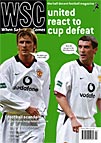 Brazil win again, but are the other sides there just to make up the numbers? Robert Shaw reports
Brazil win again, but are the other sides there just to make up the numbers? Robert Shaw reports
You won’t find the likes of Jorginho, Junior Negão and Benjamin complaining, as Charlton did, that they have to play on a beach. That is because they form part of Brazil’s triumphant squad that sealed the country’s eighth win at the World Beach Soccer Championship held in Rio this February. And with corporate sponsorship funding them as full-time professionals and an established circuit in Brazil it was little surprise that they took the title by beating Spain 8-2 in the final. In fact the only time that it has eluded Brazil was in 2001 when Portugal recorded a win in the north-eastern state of Bahia.
It is difficult to see how the other countries can shake the Brazilian grip on a sport which will be become part of the Olympics in 2008. The US manager Roberto Ceciliano saw his side go down 13-1 to the champions, but even when the average goal difference per game was five in Brazil’s favour Ceciliano felt that there was no need to introduce a goals handicap system. “There is a gap,” he admitted, “but the best way to help close it is not this way. Our guys just need to play in more tournaments like the Brazilians. We just don’t have that kind of sponsorship. In fact while McDonald’s spon-sor them, I am effectively paying for these boys to be here.”
Ceciliano, a Brazilian emigre who moved to the US 20 years ago and now runs several soccer schools, was also upset about anti-American feeling. “You expect it I suppose but it was difficult for the guys to swallow when they are listening to the anthems. We have even been getting hassle on the streets.”
Ceciliano’s team in fact reflects another curious strand of the championships – Brazilian names featured on the team-sheets for other countries. There were three in the US team, plus Jairzinho for France – unlike his namesake in 1970 he could not manage a goal a game – and the hirsute former Japanese international Ruy Ramos, who tried to defy his 46 years as he skipped across the sand looking like a cross between Brian Kilcline and Robinson Crusoe.
Brazilian success was also built around players who have grown up familiar with three codes of the game – beach football and futevolei (played on what looks like a volleyball court using everything but hands) as well as association football. “Playing on the beach helps you because you realise the different techniques needed. Sometimes you can imagine you are playing futevolei when you are moving around the court,” explained Neném, the top marksman with 15 goals in the tournament. He also got sand kicked in his face by an Italian defender who lost his patience with a series of step-overs.
The Brazilian side no longer has the celebrity stars of previous tournaments. Zico has gone off to manage Japan and Junior, who made a second career on the sand, is now in the commentary box. But as Neném admitted: “Those players were a definite inspiration for us when we were growing up and the fact they played beach football after their regular careers ended also gives it more credibility.” Experience came in the form of Junior Negão, the formidable 37-year-old who scored three in the final and was also in the squad for all of Brazil’s previous eight victories.
The tournament was not without controversy. With their excess girth, Eric Cantona’s French team looked like extras from a gangster film recruited for a pub side, but they nonetheless managed to beat finalists Portugal in the early stages. They then found themselves in hot water after an ill-tempered match against Uruguay. Cantona used his new-found acting talents in his theatrical interval addresses to his side and was involved in altercations with the South Americans and match officials during and after the match.
It all ended badly when a French contingent, including former Marseille goalkeeper Pascal Olmeta, entered the Uruguayan changing area to ask for the soap back from opposing coach Enrique Belo. In their passionate pursuit of personal hygiene, Belo was injured and paraded his wounds for Brazilian television, as he gesticulated in the general direction of Cantona and Co.
With the honourable exception of Spain’s Amarelle, who took the player-of-the-tournament award, beach football continues to look like Brazil’s World Series, with the other countries there to make up the numbers. It’s five years away, but one set of Olympic gold medals might as well be handed out now.
From WSC 194 April 2003. What was happening this month
____________________________________________
☮ Red Alert: The Crash.
I just discovered that the long awaited Market Crash is programmed by a fascist splinter group for the January 7/8, 2011. The sole purpose of "The Cantona Call" was to ensure that journalists would talk about the "soft lead" (see video below) that created a butterfly effect from Rennes. Guess what? Guess what they talked about it. Pass it on.
"In one of the greatest investment markets in the world, namely, New York, the influence of speculation (in the above sense) is enormous. Even outside the field of finance, Americans are apt to be unduly interested in discovering what average opinion believes average opinion to be; and this national weakness finds its nemesis in the stock market."
It is not to Late to do Something to Protect Ourselves Against Chaos:
☮ La Nouvelle Économie.
Cantona UN Jour, Cantona Toujours.
____________________________________________